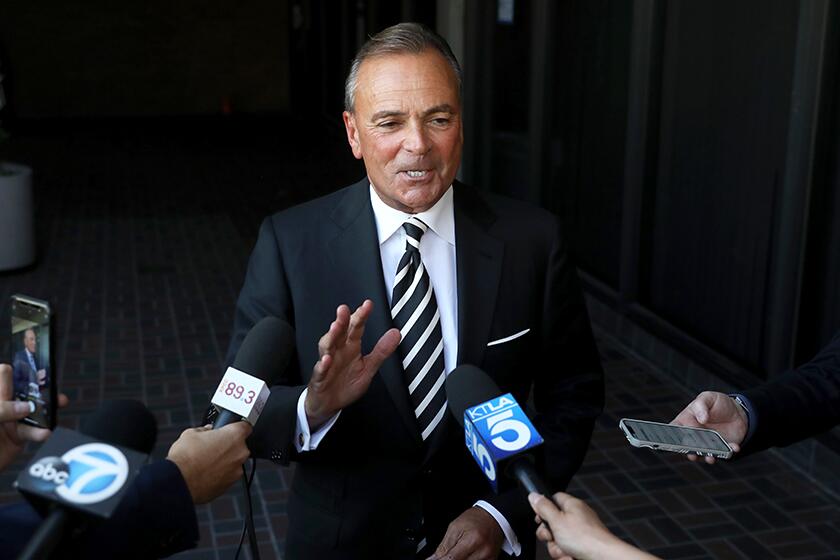Judge Kenyon Enlivened Case With a Gentle Wit
- Share via
During Los Angeles County’s historic voting rights trial, an attorney argued before U.S. District Judge David V. Kenyon that the 1990s will produce a “different kind of Hispanic candidate . . . maybe even Republican, like Sarah Flores and Gaddi Vasquez.”
“Or . . . I just can’t resist it,” Kenyon interrupted, “(like) Supervisor Schabarum.”
It was a lighthearted reference to the controversial assertion by County Supervisor Pete Schabarum that he is Latino because his paternal grandmother was Mexican.
The remark was typical of Kenyon, a folksy, good-humored ex-Marine who ruled Monday that the county Board of Supervisors violated the federal Voting Rights Act by drawing district boundaries that discriminate against Latinos.
During the three-month-long trial, Kenyon, 59, generally avoided solemn lectures to attorneys, more often bantering comfortably with lawyers and joking about himself and the problems he faced presiding over the complex case.
He complained about the mountain of exhibits--more, he said, than any other case in his courtroom in 10 years on the federal bench. “It’s very hard to keep order up here,” he said, looking out at the boxes of documents stacked haphazardly throughout the courtroom.
An avid sports fan, Kenyon interrupted the testimony of a redistricting expert from Duke University to ask: “Let’s get serious, sir, do you go to Duke basketball games?”
But he also could be tough, declaring that he would allow no settlement talks once the trial began and scolding attorneys for engaging in name calling.
Kenyon--a Republican appointed to his first judicial post by Gov. Ronald Reagan in 1971 and to a lifetime federal judgeship by Democratic President Jimmy Carter in 1980--pondered aloud whether it would be appropriate for him to order expansion of the Board of Supervisors as a means of giving a Latino a better chance at election.
“One thing that has always impressed the court about power,” he said, is that “part of the wisdom of power is knowing when not to exercise it.”
Although talkative, he is cautious. Kenyon apologized to a prospective witness after ruling that he did not have the credentials to be considered a redistricting expert.
“I find this distasteful,” the judge said, “not as distasteful as putting someone in the penitentiary, but (to find) this man who is so brilliant and so qualified in so many areas” unqualified to testify in the redistricting trial.
“For that,” he told the man, “I’m sorry.”
Kenyon declined to be interviewed about the redistricting case and has made it clear in previous interviews with The Times that he does not enjoy public attention. But he has presided over a number of other high-profile cases-- including the spy trial of ex-FBI Agent Richard Miller, the state’s challenge to the Alpha Beta-Lucky merger and the liability case stemming from the 1986 Cerritos air crash that killed 82 people.
Kenyon received his bachelor’s degree from UC Berkeley and his law degree from USC. In 1959, he went to work in MGM studios’ legal department.
Reagan appointed Kenyon to Los Angeles Municipal Court and elevated him to the Superior Court in 1972.
As a Superior Court judge in 1976, Kenyon established an experimental juvenile court project in South-Central Los Angeles, bringing together in one facility various agencies that dealt with troubled teen-agers. He was so highly regarded in the community that the Board of Supervisors renamed the facility the David V. Kenyon Juvenile Justice Center.
“Even though he was white, he came down to South-Central and walked the streets and he became the people’s friend,” Supervisor Kenneth Hahn recalled in an 1980 interview. “He didn’t go out in a black robe like so many judges would do. He went out as a human being. And he had great respect and love.”
More to Read
Sign up for Essential California
The most important California stories and recommendations in your inbox every morning.
You may occasionally receive promotional content from the Los Angeles Times.











